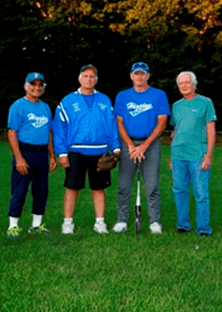
As a longtime player and manager in the Monmouth county senior softball league, Emil “coach” Jennette is always evaluating his teammates and opponents. He recalls a game when he closely studied outfielder Bobby Duncan as he ran the bases during a game.
“I was watching how he performed, and I saw that he ran well,” says Emil, a 75-year-old interior painter from Freehold Borough. “I watched his stride, and I watched his face as he came into home plate to see if I could see any pain.”
Emil wasn’t scouting for the next all-star in the over-60 league. He was seeing how well his teammate Bobby had recovered after having double knee replacement surgery the prior fall. Before his surgery, Bobby was in constant pain and could hardly sleep at night. He continued to play softball, but he required a substitute runner after getting a hit.
“After the surgery, I didn’t need a runner anymore. As a matter of fact, I started running for other people,” says Bobby, a 64-year-old golf course and athletic fields manager and Freehold Township resident. “I play tennis and softball and I golf and bowl. I don’t let anything slow me down.”
Emil had been suffering from knee pain for years. Watching Bobby’s success helped convince him to also undergo double knee replacement surgery with Michael Greller, MD, a board-certified and fellowship-trained orthopedic surgeon on staff at CentraState Medical Center.
A Team Doctor?
Emil became the third member of his softball team to have knee replacements with Dr. Greller. Jim Mavroleon, a now 68-year-old infielder, also had the procedure earlier that same year. Jim, a Freehold Township resident who is a teacher at the Career Center at Monmouth County Vocational School, said he knew it was time for surgery when he was unable to keep up with his then 16-year-old daughter during a trip to Paris. Jim says the surgery has allowed him to “be happy in my later years” and things like playing softball again are “gravy.”
“Baseball has always been a part of my life,” says Jim, who played minor league professional baseball in the early 1970s. “Sometimes you think, ‘Maybe I should stop?’ But you enjoy the competition and you enjoy the company of guys you’ve been playing ball with, in some cases, since you were in Little League.”
Emil, Jim, and Bobby did not just inspire each other—other players in the league took notice of their speedy recovery and improved performance.
That includes Vinny Quinn, a 66-year-old thoroughbred farm manager from Colts Neck. Vinny had knee pain for years but worried about taking time off from his busy job to recover.
He decided to have double knee replacement surgery with Dr. Greller at CentraState and was back on the softball field less than three months after his surgery.
“I play more softball now than I ever did when I was younger,” Vinny says. “Everything feels natural. I don’t worry about anything—I play shortstop and my lateral movement is fine, no problems. If I knew it was this good, I would have done it years ago.”
While word-of-mouth referrals are common at the Total Joint Center of New Jersey at CentraState, Dr. Greller says operating on a third of a softball team’s starting lineup in two years was a highlight for him.
The softballers say they were drawn to CentraState by the comfort and ability to recover from surgery close to home as well as the program’s reputation for helping patients get back on their feet quickly. The Total Joint Center offers a range of minimally invasive joint replacement surgeries. Patients participate in classes and physical therapy to prepare for surgery and benefit from state-of-the-art pain management to improve recovery after surgery.
“Pain control is important because we want our patients to get up and walk the same day as their surgery,” Dr. Greller says. “With knee replacements, you need the right patients who are willing to do the hard work in rehabilitation, and these guys were all very motivated.”
Quality of Life
Osteoarthritis is an age-related breakdown of the knee joint that causes pain and difficulty walking. Knee replacement surgery is usually performed when conservative treatments such as physical therapy and pain medication no longer relieve knee pain and the quality of a patient’s life is negatively affected. During knee replacement, the damaged joint surface is replaced with an artificial joint. More than 700,000 procedures are performed each year, according to the U.S. Centers for Disease Control and Prevention.
“Knee replacement should be done when your quality of life is suffering,” Dr. Greller says. “It’s not when your doctor says to do it, not when your friend says to do it, not when the X-rays say to do it, but when you say, ‘I can’t live like this anymore. I don’t want knee pain. I want a better way of life.’”
Dr. Greller says patients should not expect to run a marathon after knee replacement surgery, but they should be able to get back to most moderate activities—from tennis and pickle ball to swimming, bicycling and yes, softball.
“The goal is to get back to a better quality of life than you currently have because you are no longer going to have stiffness and swelling in your knees,” Dr. Greller says. “You want to be able to do the things in life that are important to you.”
For his part, Emil says he hopes his knee replacements will allow him to continue to play softball into his 80s and beyond.
“I meet a lot of people in the area, and they’re on the fence about whether to have surgery and where to have it,” Emil says. “I say, ‘Listen, you don’t have to go to New York—you can stay right here locally and you’re going to be very happy with CentraState.’”
For more information about CentraState’s Total Joint Center, call 866-CENTRA7 (866-236-8727).





